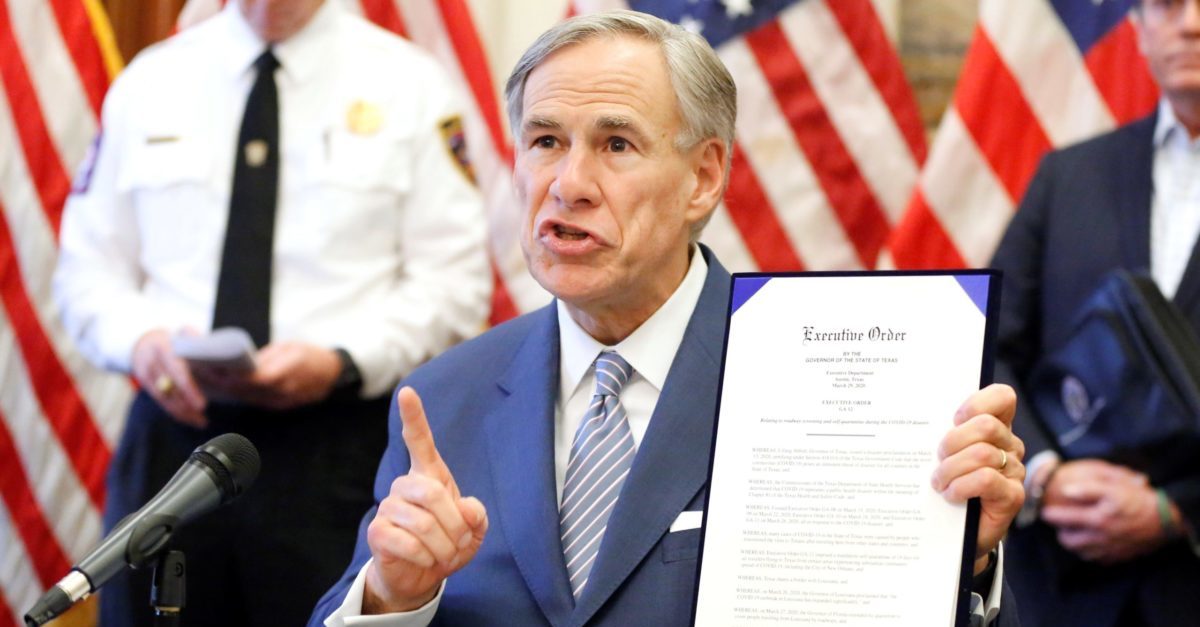
Texas Gov. Greg Abbott exceeded his constitutional authority last week when he issued Executive Order GA-13 curtailing the ability of state judges to release certain defendants on personal bond. That’s according to a lawsuit filed in Travis County District Court. The governor’s order, which is meant to encourage social distancing to prevent the spread of COVID-19, prohibits judges from granting no-money bail to defendants accused of a violent crime or who had previously been convicted of a violent crime.
The complaint was filed Tuesday by both the ACLU and the Texas Fair Defense Project on behalf of 16 Harris County misdemeanor magistrate judges and several civil rights organizations. It argues that Executive Order GA-13 violated the Texas Disaster Act and the State Constitution by empowering Abbott to usurp powers granted to the judiciary and legislative branches of state government.
The lawsuit says the Disaster Act allows the governor to suspend provisions of “any regulatory statute.” That limits the governor to provisions which govern state regulatory agencies, the lawsuit argues. Discretion over a defendant’s bond is granted to the judiciary by the state’s criminal code.
“GA-13 purports to categorically suspend judicial deadlines, restrict judicial discretion to order nonmonetary conditions of release, and preclude sheriffs from commuting sentences for good time. In so doing, GA-13 is not suspending ‘regulatory statute[s] prescribing the procedures for conduct of state business,’” the lawsuit argues. “Instead, in purporting to suspend provisions of the Code of Criminal Procedure, as well as ‘all other relevant statutes and rules’ relating to personal bonds and good time credit, GA-13 far exceeds the Disaster Act’s authority.”
The lawsuit also claims that Abbott’s purported authority over criminal proceedings in entirely unfounded, regardless of the defendant’s history.
“In every case, including for violent offenses, pretrial liberty may only be circumscribed by judges and magistrates in this State—not by the Executive Branch,” the lawsuit said. It went on to argue:
Under the Texas Constitution, the Governor does not have authority to deny pretrial release, impose blanket restrictions on what judges and magistrates may decide in individual cases, or create new categories of considerations in which to cabin judicial discretion. Because the Constitution entrusts decision-making authority over individual cases to the Judiciary, the Executive Branch may not ‘encroach on substantive judicial powers [or] interfere with the powers of the judicial branch.
Andre Segura, the legal director for the ACLU of Texas, said the governor’s order was actively helping spread the virus among the state’s most vulnerable populations.
“The Texas Constitution makes it clear: the Governor does not have the authority to suspend state law, particularly those that govern our criminal justice system, even during an emergency,” said Segura. He continued:
At a time when public health experts agree that limiting the population in jails is critical to prevent outbreaks of COVID-19, this order ties local officials’ hands in trying to mitigate the impact of the pandemic for all Texans and prevent loss of life. Under this order, those unable to afford bail are required to ride out a pandemic in the dangerous setting of a jail, while wealthier people are able to buy their way out.
Read the full lawsuit below.
Abbot EO Complaint by Law&Crime on Scribd
[Phopto by Tom Fox/Pool/Getty Images.]
Have a tip we should know? [email protected]